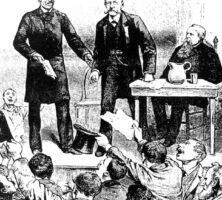The largest labor organization in late-nineteenth-century America, the Order of the Knights of Labor claimed more than 700,000 members at its apex in 1886. The Knights’ membership peaked simultaneously in Georgia at about 9,000. Although the Knights faded from Georgia by the early 1890s, the Order led some significant labor conflicts and local political challenges and recruited workers regardless of skill, race, or gender.

From Harper's Weekly
Origins and Growth
Formed in Philadelphia, Pennsylvania, in 1869, the Knights first appointed southern organizers nine years later. In 1879 E. W. Conner organized a Knights of Labor lodge or local assembly in his hometown, Rome, Georgia. This lodge lapsed within one year, however, and it was not until 1882 that the Knights established a lasting presence in the state.
The Knights did not become significant in Georgia until the mid-1880s. Although supposedly nonpartisan, the Order began to enter municipal politics in 1885, when it nearly elected its mayoral candidate in Athens. In 1886 the Knights nominated political candidates in Atlanta, Augusta, Decatur, Marietta, Macon, and Savannah and enjoyed some electoral success in the latter two cities.
Strikes and Boycotts
The Knights’ national leadership emphasized cooperative enterprises and land and monetary reform, rather than strikes or boycotts, as the solutions to workers’ problems. Rank-and-file members, however, often proved quite willing to engage in confrontations with their employers. The Knights led several notable labor conflicts in Georgia. In 1883 Knights of Labor telegraphers in several Georgia cities participated in an unsuccessful nationwide strike against Western Union. During the winter of 1885-86, the Knights led a boycott against the Atlanta Constitution over wages and recognition for the Atlanta Typographical Union. The boycott achieved the latter goal. The Knights also waged a four-month battle against Augusta textile mill owners in a strike-lockout in 1886, but won only meager concessions for the 3,000 workers involved.
The Knights of Labor recruited hundreds of African American members in Georgia, primarily in segregated local assemblies. Organizing Black workers, especially in rural areas, could be a dangerous task. In 1887, for example, a mob of whites shot and nearly killed Hiram F. Hover, a white man who tried to organize Black farm laborers at Warrenton. Another less devoted white organizer, however, defrauded Blacks by organizing them into local assemblies and then pocketing their charter fees rather than forwarding the fees to the Knights’ national headquarters in Philadelphia.
Decline
In November 1889 the Knights of Labor held its annual national General Assembly in Atlanta. By then, however, failed strikes, lockouts, blacklisting, and dissent among members over the Knights’ political activity had reduced the organization’s size and influence in Georgia and throughout the nation. Attempts at a coalition with the Farmers’ Alliance and a small role in the Populist movement failed to halt the Knights’ decline. In July 1893 the Georgia State Assembly of the Knights of Labor met for the last time, although scattered local assemblies continued to exist. Knights in Brunswick and Savannah maintained locals as late as 1901.
Despite its demise, the Knights of Labor played a pioneering role in organizing American and especially southern laborers. In Georgia the Knights gave workers an outlet for protest against low wages and harsh working conditions in relatively new industries, as well as the means to challenge Democratic dominance of local politics. The organization also made at least some sincere efforts at overcoming racial barriers among the working classes. If the Knights ultimately failed to achieve these goals, so did most of the labor organizations that would follow in Georgia.






